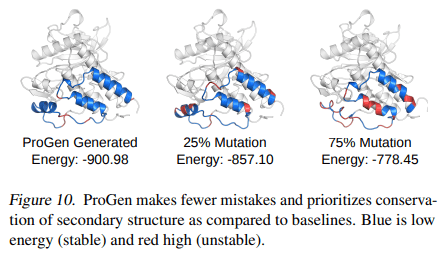TL;DR:
- ProGen, developed by Salesforce AI Research, is an AI model for precise protein sequence generation.
- It utilizes conditioning tags and a next-token prediction mechanism, akin to natural language processing, to create proteins with specific attributes.
- ProGen has demonstrated proficiency in generating near-native structural energies in protein sequences.
- Successful creations like VEGFR2 and GB1 highlight ProGen’s ability to meet specific functional requirements.
- This advancement in protein engineering has far-reaching implications for biotechnology, pharmaceuticals, and environmental sustainability.
Main AI News:
In the realm of scientific innovation, the quest for functional proteins has always held paramount importance. Industries spanning healthcare, biotechnology, and environmental sustainability have long sought the means to engineer proteins with precision and purpose. Traditional methods, reliant on random mutation and natural selection, have often fallen short in the pursuit of tailored protein design. Recognizing this gap, researchers have turned to artificial intelligence (AI) as a transformative solution.
Enter ProGen, the brainchild of a Salesforce research team, poised to usher in a new era of controlled protein sequence generation. Departing from conventional approaches, ProGen harnesses the power of a vast protein sequence dataset, enhanced by the integration of conditioning tags. This unique approach equips the model with the ability to decipher the intricate language of proteins, affording it the capability to predict successive amino acids within a sequence. This breakthrough promises to streamline the design and fabrication of proteins with precisely tailored attributes.
ProGen’s methodology hinges on a next-token prediction mechanism, reminiscent of the predictive algorithms found in natural language processing. With access to an extensive repository of over 100,000 conditioning tags, encompassing the multifaceted aspects of protein sequences, ProGen excels at generating novel proteins while adhering to predefined structural and functional parameters. Evaluation of ProGen’s performance underscores its proficiency in creating protein sequences that closely mimic native structural energies—a testament to its potential functional viability. Notable successes include the creation of proteins like VEGFR2 and GB1, exemplifying ProGen’s knack for crafting sequences tailored to specific functional requirements.
The research team’s meticulous analysis leaves no doubt about ProGen’s remarkable capacity to predict and generate protein sequences endowed with desired properties. This achievement represents a significant milestone in the realm of protein engineering, achieved through the amalgamation of cutting-edge AI technologies. ProGen stands as a beacon of precision and control in protein design, offering fresh avenues for accelerated scientific advancement across diverse domains, from biotechnology and pharmaceuticals to environmental sustainability. Its successful application in generating proteins with predefined functions signifies a transformative leap beyond the constraints of traditional protein engineering paradigms.

Source: Marktechpost Media Inc.
Conclusion:
ProGen’s innovative approach to protein engineering using AI has the potential to revolutionize multiple industries. Its precision in designing proteins with tailored properties opens doors to accelerated progress in biotechnology, pharmaceuticals, and environmental solutions, marking a significant leap beyond traditional methods. This development is poised to reshape the market landscape by offering unparalleled control and efficiency in protein design and production.

